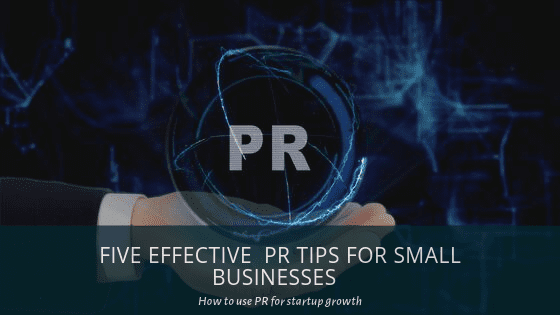Today, effective PR is critical to a company’s success. It doesn’t just establish your reputation but also builds consumer trust. Unfortunately, many small businesses assume PR is only for large corporations. But, nothing could be further from the truth. PR plays an important role in the growth and success of all organisations.
Most startups set aside a budget for marketing and advertising. Some assume PR falls under these categories, but that is not the case. Even when they understand the differences, many people
We discuss some of the most common PR mistakes and how to avoid them.
Luckily, there are several effective, budget-friendly PR tips for small businesses. Below, we’ve listed five of our top tips to help you get started.
Create a press kit

A press kit – or media kit – is a prepared collection of your promotional material and information about your company. Having one available means the media can preserve your brand if they report on you.
Your kit needs to be in a digital format for easy access and sharing. Ideally, it will include details of your company such as your background and bios of the executive team. You should also include professional headshots and high-quality logos. Provide information about your services and products, and pictures if possible. Lastly, ensure you’ve listed the contact information of the person who handles your media.
You do have flexibility in how you present your press kit. A PDF works great, but Word documents or Powerpoint presentations work too. We suggest using a service like Google Drive or Dropbox that gives you a shareable link for your website. Whichever format you choose, your kit has to be informative and intriguing. If it isn’t, a journalist may decide you’re not the right fit for their article.
Network

It’s true what they say about “who you know.” Try to attend industry events and seminars whenever you can. You can learn a lot from your contemporaries and your competition. From a PR perspective, it’ll give you a chance to be seen by attendees from the media.
Networking and relationship-building are crucial to effective PR. That being said, networking at these events shouldn’t be about short-term gain. The most prosperous connections are based on long-term relationships. Once you’ve introduced yourself to some key characters, be sure to follow up with them after the event. People don’t like being hounded just because someone perceives them as useful. Try not to make every conversation about what you want from them.
It’s also important to know when to quit. If the person you’re contacting isn’t responsive, don’t put them off by spamming them with emails or calls. You should also research the people you meet at events. You may hit it off with a journalist, only to discover their writing isn’t a good fit for you. Lastly, take plenty of spare business cards! There’s not much point in making connections if people can’t get in touch with you later.
Contribute rich content to relevant publications

If you’re an expert in your field, you need a way to let people know. Using your media contacts, look for opportunities to help them. This may be as simple as telling them you’re available if they have questions about your industry. If you can, try and persuade an outlet to let you contribute an article personally. This doesn’t have to be directly about your company. In fact, if anything, you shouldn’t promote your brand too hard here.
An op-ed is an excellent way for you to put your opinion out there. These efforts are also mutually beneficial. From a news outlet’s point of view, they’re getting expert content for free. For you, it’s great PR that will boost your reputation. Additionally, if your work ends up online you can benefit from an SEO bump! However, for this approach to work, your pitching needs to be spot on.
We look at content resources that every startup should use.
Write a report relevant to your industry
You don’t have to rely solely on the media to make your voice heard. You should also use your own platforms to publish material. Try writing a report that would be of interest to others in your industry. Your reputation within your field is just as important as your reputation among consumers. Try giving your unique perspective on common problems faced by you and your contemporaries.
While it may not be the same as national news coverage, industry publications matter. These journalists are more likely to understand the intricacies of your report. Additionally, it’s always good to be the person who starts a conversation. Don’t be controversial for the sake of it, but try to get people talking!
Publish superb blog content

As a business, you have complete control over your own blog. There is a direct correlation between posting frequency and traffic growth. Regardless, quality is always better than quantity. If you don’t have the resources to post multiple times a day, focus on crafting excellent content.
Aside from SEO benefits, a diverse blog has plenty of uses. It shows you’re an expert to consumers, journalists, and professionals. The best part is you can make the most of different formats. Try interviewing one of your executives to add a face to the business. Maybe write a piece that answers all the questions you had when you first started out?
Our CEO shares some trade secrets in this guide to getting your startup featured in the news.
If you’re curious to learn more about content marketing and PR or want to speak to a SYNC consultant about starting your brand’s PR journey, contact us at [email protected]

